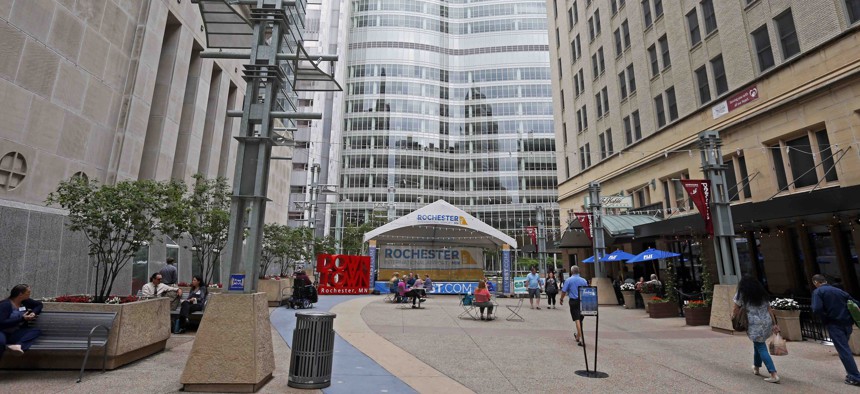Virus Casts Uncertainty Over City Budget and Economic Development in a Health Care Hub

A pedestrian mall leads to the campus of the Mayo Clinic complex on July 2, 2019, in Rochester, Minn. AP Photo/Jim Mone

Connecting state and local government leaders
Like other localities, the coronavirus has Rochester, Minnesota facing questions about both its financial outlook and future economic growth.
Rochester, Minnesota, with about 118,000 residents, is home to the Mayo Clinic, a major health care facility and the state’s largest employer. In a typical year, this medical colossus draws a steady stream of patients and others to the mid-sized city.
But Mayor Kim Norton described Thursday how the flow of travelers to Rochester slowed dramatically after the onset of the coronavirus outbreak. “Our hotels are empty, our restaurants and bars and shops are empty because three million visitors a year are not coming,” she said, speaking during an online event hosted by The Volcker Alliance and Penn Institute for Urban Research.
Mayo deferred non-urgent elective surgeries and other procedures back in March because of the virus, before resuming these types of visits again in early May. Rochester, meanwhile, is in the midst of executing a 20-year plan that involves substantial new investment anchored around the non-profit Mayo Clinic, with the hope of enhancing the city’s draw as a global destination within the health care sector.
This program is slated to involve over $5 billion of private investment and $585 million in public funding. Norton noted that the government money lined up for this program should be available to go toward supporting construction and infrastructure projects, like sewer works.
The already planned development program could underpin jobs and help the city blunt the effects of the virus-driven economic downturn, allowing for a quicker recovery. But Rochester, like other states and localities, is nevertheless in uncharted territory due to the pandemic.
“When you look at the information that says this may impact us in the long run, many years out, what does that mean?” Norton said. “Not only our city budget, but also to the growth that we have with our economic development package that we’re in the middle of doing.”
Located about 85 miles southeast of Minneapolis, Rochester has gained about 12,000 residents over the past decade and has been in solid shape financially overall, with a sterling triple A credit rating. It’s 2020 budget is about $390 million, excluding public utilities.
A top source of city revenue is property taxes. In the near-term at least that’s good for Rochester’s financial stability. Property taxes aren’t as prone to the same immediate drops other revenues like sales taxes have seen due to the virus and the economic slowdown it has caused.
But another large chunk of revenue for the city is hotel taxes, Norton said. And those have dried up with the decline in visitors that has coincided with the virus. Revenues tied to airports, parking and transit have also taken a slide due to the pandemic, according to the mayor.
Since the onset of the virus outbreak, she said, the city has been forced to find $26 million in budget cuts. “We're not mowing lawns, we've got a hiring freeze on, we hope not to lay off, but we probably will be facing that in the coming years if things don’t turn around,” she said.
The city is too small to qualify for direct federal aid from a $139 billion fund for states and localities that was established in recently passed coronavirus relief legislation, and it’s unclear how much, if any, it will receive from money allotted from this fund to the state.
Republican leaders in Congress haven’t shown a great deal of urgency in getting legislation passed that would deliver additional emergency aid to smaller-sized localities to help them with the budget difficulties that the coronavirus has brought on.
Debate over such a package is ongoing on Capitol Hill. But the spotlight in the past week has shifted away from Congress as attention instead focuses on the protests and unrest sparked by the death of George Floyd, a black man who died in police custody in Minneapolis.
Norton did note that the Rochester region has received some federal money related to the coronavirus, such as about $7 million for transit and around $2.5 million for a local airport.
She noted the city has been trying to help local small businesses get through the virus crisis with loans and grants, but that it's trying to do so while struggling to manage its own finances. “If we don't get some relief, we can't continue to provide financial support,” she said.
“We don’t know how long this pandemic is going to continue,” she added. “People are acting like this is over. It’s not over and it won't be over for some time and the impacts will continue.”
Bill Lucia is a senior reporter for Route Fifty and is based in Olympia, Washington.

NEXT STORY: Fed Again Expands State and Municipal Lending Program





